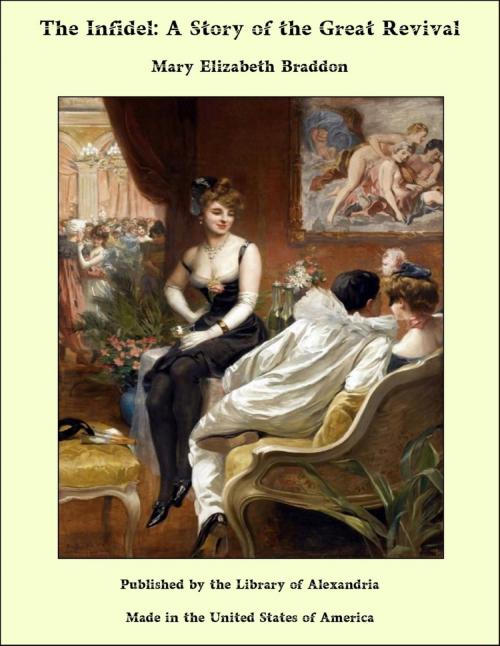The Infidel: A Story of the Great Revival
Nonfiction, Religion & Spirituality, New Age, History, Fiction & Literature| Author: | Mary Elizabeth Braddon | ISBN: | 9781465606341 |
| Publisher: | Library of Alexandria | Publication: | March 8, 2015 |
| Imprint: | Language: | English |
| Author: | Mary Elizabeth Braddon |
| ISBN: | 9781465606341 |
| Publisher: | Library of Alexandria |
| Publication: | March 8, 2015 |
| Imprint: | |
| Language: | English |
Father and daughter worked together at the trade of letters in the days when George the Second was king and Grub Street was a reality. For them literature was indeed a trade, since William Thornton wrote only what the booksellers wanted, and adjusted the supply to the demand. No sudden inspirations, no freaks of a vagabond fancy ever distracted him from the question of bread and cheese; so many sides of letter-paper to produce so many pounds. He wrote everything. He contributed verse as well as prose to the Gentleman's Magazine, and had been the winner of one of those prizes which the liberal Mr. Cave offered for the best poem sent to him. Nothing came amiss to his facile pen. In politics he was strong—on either side. He could write for or against any measure, and had condemned and applauded the same politicians in fiery articles above different aliases, anticipating by the vehemence of his phrases the coming guineas. He wrote history or natural history for the instruction of youth, not so well as Goldsmith, but with a glib directness that served. He wrote philosophy for the sick-bed of old age, and romance to feed the dreams of lovers. He stole from the French, the Spaniards, the Italians, and turned Latin epigrams into English jests. He burnt incense before any altar, and had written much that was base and unworthy when the fancy of the town set that way, and a ribald pen was at a premium. He had written for the theatres with fair success, and his manuscript sermons at a crown apiece found a ready market. Yes, Mr. Thornton wrote sermons—he, the unfrocked priest, the audacious infidel, who believed in nothing better than this earth upon which he and his kindred worms were crawling; nothing to come after the tolling bell, no recompense for sorrows here, no reunion with the beloved dead—only the sexton and the spade, and the forgotten grave. It was eighteen years since his young wife had died and left him with an infant daughter—this very Antonia, his stay and comfort now, his indefatigable helper, his Mercury, tripping with light foot between his lodgings and the booksellers or the newspaper offices, to carry his copy, or to sue for a guinea or two in advance for work to be done. When his wife died he was curate-in-charge of a remote Lincolnshire parish, not twenty miles from that watery region at the mouth of the Humber, that Epworth which John Wesley's renown had glorified. Here in this lonely place, after two years of widowhood, a great trouble had fallen upon him. He always recurred to it with the air of a martyr, and pitied himself profoundly, as one more sinned against than sinning.
Father and daughter worked together at the trade of letters in the days when George the Second was king and Grub Street was a reality. For them literature was indeed a trade, since William Thornton wrote only what the booksellers wanted, and adjusted the supply to the demand. No sudden inspirations, no freaks of a vagabond fancy ever distracted him from the question of bread and cheese; so many sides of letter-paper to produce so many pounds. He wrote everything. He contributed verse as well as prose to the Gentleman's Magazine, and had been the winner of one of those prizes which the liberal Mr. Cave offered for the best poem sent to him. Nothing came amiss to his facile pen. In politics he was strong—on either side. He could write for or against any measure, and had condemned and applauded the same politicians in fiery articles above different aliases, anticipating by the vehemence of his phrases the coming guineas. He wrote history or natural history for the instruction of youth, not so well as Goldsmith, but with a glib directness that served. He wrote philosophy for the sick-bed of old age, and romance to feed the dreams of lovers. He stole from the French, the Spaniards, the Italians, and turned Latin epigrams into English jests. He burnt incense before any altar, and had written much that was base and unworthy when the fancy of the town set that way, and a ribald pen was at a premium. He had written for the theatres with fair success, and his manuscript sermons at a crown apiece found a ready market. Yes, Mr. Thornton wrote sermons—he, the unfrocked priest, the audacious infidel, who believed in nothing better than this earth upon which he and his kindred worms were crawling; nothing to come after the tolling bell, no recompense for sorrows here, no reunion with the beloved dead—only the sexton and the spade, and the forgotten grave. It was eighteen years since his young wife had died and left him with an infant daughter—this very Antonia, his stay and comfort now, his indefatigable helper, his Mercury, tripping with light foot between his lodgings and the booksellers or the newspaper offices, to carry his copy, or to sue for a guinea or two in advance for work to be done. When his wife died he was curate-in-charge of a remote Lincolnshire parish, not twenty miles from that watery region at the mouth of the Humber, that Epworth which John Wesley's renown had glorified. Here in this lonely place, after two years of widowhood, a great trouble had fallen upon him. He always recurred to it with the air of a martyr, and pitied himself profoundly, as one more sinned against than sinning.















